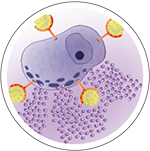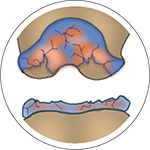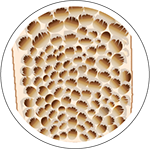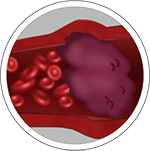Welcome!
Your DNA Brought You Here
Your 3X4 Genetics Blueprint and Menopause
Inside your body are several highly sophisticated metabolic systems keeping you alive, healthy, and running smoothly. This network is like a complex underground railroad system, where multiple separate but interconnected parts are meticulously organized to keep everything on track, on schedule, and functioning optimally.
Menopause is complex. The recommendations below must be considered in the context of your entire 3X4 Blueprint report, your current health status, and your medical history, to maximize the outcome. If you feel your health concerns are contributing to your menopause challenges, please visit our 3X4 Practitioner Locator to connect with one of our 3X4 accredited practitioners that can assist you in managing your symptoms.
For each of the pathway recommendations we have provided, supplements have been suggested. To be sure you are taking only the supplements you need, we advise you to consult with a health care professional. The supplement recommendations provided here are a guideline only. We have summarized the most beneficial recommendations for you at the end of this page
Click On The Section You'd Like To Learn More About
Swipe to explore
 DETOXIFICATION
DETOXIFICATION
Detoxification is the body's way of getting rid of toxins that could otherwise build up and interfere with health. Signs of poor detox include lethargy, fatigue, difficulty concentrating, and unexplained aches and pains in the body. The liver is the main site of whole-body detox but every cell has its own toxin-eliminating processes to keep it clean, healthy, and working well. Detoxification can be optimized by making the right diet and lifestyle changes to support good cellular cleaning processes.
RECOMMENDATIONS
Diet:
- Eat foods that support the liver to detoxify the body efficiently such as: cilantro, arugula, watercress, basil, broccoli, cabbage, asparagus, cauliflower, bok choy, radish, garlic, ginger, turmeric, oregano.
- Avoid nonorganic versions of foods that are known to be high in pesticides like strawberries, blueberries, and grapes.
- Limit your consumption of grain-fed meats and farmed fish.
Lifestyle:
- Make use of techniques that promote the elimination of toxins from the body such as exercise-induced sweating or sauna, dry brushing, and jumping on a trampoline.
- Make time for urinary elimination and healthy bowel movements and ensure optimal hydration.
- Try to avoid using large quantities of cleaning products, paint, and glue in your home environment, and plastic packaging and water bottles as they contain hormone-disrupting chemicals. Limit your exposure to pesticides and chemicals in your cosmetics.
Supplements:
- Avoid exceptionally high doses of individual vitamins
- Sulforaphane 20mg - like EnduraCell by Cell Logic
 OXIDATIVE STRESS
OXIDATIVE STRESS
Oxidative stress is the human equivalent of rusting. The impact of all exposures over time results in damage to our cells. Unmanaged, oxidation can impact on our energy levels, memory, premature aging and sometimes cancer risk. In a healthy functioning cell, enzymes that counteract oxidative damage, a 'rust block' so to speak, are made. The ability to make those enzymes is determined by certain genes. However, a good diet and lifestyle can aid towards a lower oxidative burden and help maintain the health of your cells.
RECOMMENDATIONS
Diet:
- Eat foods that enhance your anti-oxidant potential like pomegranates, beets, dark green leafy vegetables, arugula, bok choy, celery, & carrots.
- Avoid foods that increase the production oxidative damage like excess sugar and high processed fats.
Lifestyle:
- Reduce your oxidative stress potential by regulating your circadian rhythm through good sleep routines, avoiding blue light technology, and focusing on good recovery after intense exercise.
- Limit your exposure to heavy metals such as lead in water pipes, mercury in fish, & cadmium in cigarettes.
Supplements:
- 250mg Glutathione
- Avoid exceptionally high doses of individual vitamins
 INFLAMMATION
INFLAMMATION
Inflammation is a normal automatic immune response to injury, irritation, or infection. When you bump your toe and it becomes swollen, that's the inflammatory response working to speed up healing. Sometimes injuries or irritations are internal (in places like our gut, muscles, joints, or blood vessels). Inflammation is protective by design but can become destructive if left unchecked. Long-term, chronic inflammation can eventually lead to conditions like arthritis, eczema, IBS, autoimmune conditions, and several diseases.
RECOMMENDATIONS
Diet:
- Favor foods that are known to be anti-inflammatory and promote good gut health like: high-fibre whole grains, dark green leafy vegetables, onions, garlic, berries, apples, fatty fish and nuts.
- Include herbs and spices like turmeric, cardamom, ginger, black pepper, rosemary, cinnamon & green tea.
- Avoid foods that trigger inflammation like refined, processed foods, high in sugar and poor-quality oils such as deep-fried takeaways. Take note of foods that are common triggers for migraine such as chocolate, dairy, gluten, and coffee.
Lifestyle:
- Consider regular session of stress/pain management using therapies like: acupuncture, pressure point massage, physiotherapy, meditation, yoga.
- Consider intermittent fasting.
- Avoid where possible, triggers that produce inflammation such as over exercising, sleep deprivation, & mold exposure.
Supplements:
- Omega-3s (EPA & DHA) 1000mg daily
- Avoid Omega 6 supplementation.
 METHYLATION
METHYLATION
Methylation is the biochemical process of making sure every cell is functioning optimally. Methylation is not just responsible for how we repair genetic material, but also how we make energy, respond to stress, handle inflammation, how well our cells detoxify, and how our brain chemistry works. Methylation is the process involved in actually turning genes on or off. We may be able to reduce our risk of developing certain diseases and some types of cancers by optimizing methylation.
RECOMMENDATIONS
Diet:
- Eat regular portions of foods rich in magnesium, B-vitamins, and good quality proteins sources such as: eggs, poultry, whole grains, avocado, citrus, legumes, nuts, & seeds.
- Avoid alcohol as it depletes your vitamin B status.
Lifestyle:
- Manage stress using techniques like meditation, yoga, grounding, & walking barefoot in nature.
- Limit your exposure to hormone disruptors such as BPA in plastic and thermal cash receipts and pesticides.
Supplements:
- Multi- B complex with methylated B vitamins and minerals especially magnesium.
- Avoid high doses of methylated B vitamins.
 HISTAMINE OVERLOAD
HISTAMINE OVERLOAD
Histamine is a chemical produced by mast cells, that is involved in immunity and the removal of allergens from the body. It also helps with digestion and is released in response to injury and toxins. Histamine can be made by bacteria in the gut but is also present in certain foods. Genes regulate enzymes that are responsible for histamine breakdown. Inefficient breakdown may result in a histamine overload and cause symptoms like migraines, flushing, dizziness, skin rashes and hives.
RECOMMENDATIONS
Diet:
- Eat foods rich in luteloin, quercetin, vitamin B6 and vitamin C, that help break down histamines such as apples, fig, capers, basil, rosemary, bell peppers, celery, broccoli, and cabbage.
- Avoid foods that are naturally high in histamine such as fermented dairy, smoked meats, aged cheese, pickles, soy sauce, and alcohol should be eaten with caution.
Lifestyle:
- Manage stress using techniques like meditation, yoga, grounding, & walking barefoot in nature in order to reduce excessive histamine production compounding menopause-related symptoms.
- Avoid extreme temperatures, aspirin & other common anti-inflammatory medications such as ibuprofen.
Supplements:
- Multivitamin and mineral with methylated B vitamins.
- Avoid indiscriminate use of probiotics as they may produce histamine. Ask your healthcare provider to advise you on this.
 HORMONE BALANCE
HORMONE BALANCE
Hormones are chemical messengers produced by our glands. They instruct organs and systems in the body on how to function. The main female hormones include estrogen and progesterone. These are necessary throughout the lifecycle for the regulation of most major female-related bodily processes including puberty, fertility, pregnancy, and menopause. Androgens are also present in women but to a lesser degree. The main male hormones are known as androgens which include the powerful male hormone testosterone. Androgens are necessary throughout the life cycle for the regulation of most major male-related bodily processes including puberty, fertility, and andropause. Estrogen is also present in men but to a lesser degree. Ineffective hormone metabolism can contribute to certain conditions. Genes, as well as diet and lifestyle factors, regulate the activation and breakdown of these hormones.
RECOMMENDATIONS
Diet:
- Eat foods high in B vitamins, magnesium and fiber to assist with hormone regulation and their detoxification such as cilantro, sesame seeds, nuts, broccoli, cabbage, and radish.
- Avoid nonorganic versions of foods that are known to be high in pesticides like strawberries, blueberries, grapes.
- Limit your consumption of grain-fed meats and farmed fish.
Lifestyle:
- Support the elimination of toxins from hormone metabolism by sweating using exercise, or sauna or lymphatic drainage through rebounding or massage.
- Try to avoid using large quantities of cleaning products, paint, and glue in your home environment.
- Limit your exposure to pesticides and chemicals in your cosmetics.
Supplements:
- Sulforaphane 20mg - like EnduraCell by Cell Logic
- Be cautious with Diindolylmethane (DIM) as it may be contra-indicated in your genetic makeup.
 MOOD AND BEHAVIOR
MOOD AND BEHAVIOR
It is normal for our mood to change depending on the situation, but when our emotional state leads to changes in behavior that affect our ability to deal with daily routines, support should be sought. Genetics affects our ability to manufacture and balance chemicals in the brain that are necessary to manage mood, anxiety, depression, addiction and related behaviors. In addition, diet and lifestyle choices impact brain chemicals and may require adjustment.
RECOMMENDATIONS
Diet:
- Eat foods rich in protein, choline and B vitamins such as poultry, game meats, beef, liver, fatty fish, broccoli, mushrooms, oatmeal, & quinoa. These support the manufacture of neurochemicals.
- Avoid foods that have a negative effect on mood and brain health such as sugary and processed foods, and oils such as corn, soy, canola(rapeseed) and palm oil. These are known to cause inflammation.
Lifestyle:
- Manage stress by stimulating the vagus nerve through loud singing or gargling.
- Practice box breathing.
- Avoid exposure to blue light from screens, close to bedtime as it disrupts your circadian rhythm and interferes with the production of melatonin that supports brain health.
- Be aware of high-stress situations that impact neurochemical balance.
Supplements:
- Take L-Theanine daily
 MEMORY AND BRAIN HEALTH
MEMORY AND BRAIN HEALTH
The brain is the control center of the body and keeping it healthy is crucial for overall mental and physical health. Apart from regulating all of your hormones and other biological processes, the brain is also responsible for cognitive function, including attention, focus, learning capacity, and memory. Brain health and function tend to decline with age but at a faster rate in individuals with unfavorable diet and lifestyle behaviors. Certain genetic variations may be another reason why our brain health and cognitive function might not be optimal.
RECOMMENDATIONS
Diet:
- Include food daily that reduces inflammation of the brain and supports brain health including turmeric, rosemary, holy basil, chili peppers, wild-caught oily fish, berries, olives, nuts, and seeds.
- Avoid foods high in omega-6 oils such as those made from corn, soybean, safflower, and sunflower.
- Avoid greasy fatty meats, deep-fried chicken and skins like pork crackling.
- Also be aware of the mercury content of fish and avoid those known to be high in this toxic heavy metal.
Lifestyle:
- Regular physical exercise which helps prevent muscle loss, and improve dopamine levels, has been shown to help reduce inflammation which helps to mitigate symptoms associated with menopause.
- Avoid sleep deprivation, and ensure 6-8 hours of sleep is recommended for optimal brain health.
- Avoid exposure to toxins such as pesticides, mold, and heavy metals in your environment.
- Avoid blue light technology 1-2 hours before bedtime.
Supplements:
- Omega 3 – 1000mg EPA and DHA daily
- Avoid omega-6 supplementation.
 COLLAGEN AND JOINTS
COLLAGEN AND JOINTS
All our cells are continuously being renewed by being broken down and replaced by new ones. Collagen is the major structural protein and the foundation of all our soft tissue (skin, hair, nails, joints, and organs). Variations in collagen genes might affect the structure and function of these areas. Causing excessive breakdown of cells without a comparable formation of new cells will result in degeneration. Genes play a large part in the process of collagen formation and breakdown, as do lifestyle factors such as diet and exercise.
RECOMMENDATIONS
Diet:
- Include foods that boost collagen manufacture like quality animal protein, wild-caught seafood, cashews, oats, quinoa, and legumes.
Lifestyle:
- Focus on exercises that support your core strength and maintain flexibility to manage stability.
Supplements:
- Hydrolyzed Collagen
 BONE HEALTH
BONE HEALTH
Bones offer important structural support and protective roles within our body. Bone is made up of minerals such as calcium and phosphorus, which is also used elsewhere in the body. The turnover of these minerals in the breakdown or build-up of new bone cells is important for bone health. Gene variants may impact these processes and affect the balance of breakdown and build-up. Diet and lifestyle choices also contribute a great deal to these processes.
RECOMMENDATIONS
Diet:
- Consume mineral and vitamin K-rich foods such as bone broth, seaweed, dark leafy vegetables and sardines, to support bone strength.
Lifestyle:
- Weight-bearing exercises done outdoors for sun exposure will help to maintain bone strength through menopause.
Supplements:
- Vitamin D3 (2000-5000IU per day)
- Calcium, Magnesium & Vitamin K2
 GLUCOSE AND INSULIN
GLUCOSE AND INSULIN
The brain is the control center of the body and keeping it healthy is crucial for overall mental and physical health. Apart from regulating all of your hormones and other biological processes, the brain is also responsible for cognitive function, including attention, focus, learning capacity, and memory. Brain health and function tend to decline with age but at a faster rate in individuals with unfavorable diet and lifestyle behaviors. Certain genetic variations may be another reason why our brain health and cognitive function might not be optimal.
RECOMMENDATIONS
Diet:
- Blood sugar imbalances may contribute to symptoms associated with menopause. Include food rich in nutrients that support optimal insulin function and blood sugar regulation like sweet peppers, cinnamon, Brazil nuts, broccoli, sweet potato, poultry, nuts, and seeds.
- Avoid refined, sugary, and processed fast foods that increase blood glucose levels.
Lifestyle:
- Regular physical exercise, and intermittent fasting (12-14 hours overnight) regulate insulin function and balance blood glucose.
- Regular physical exercise, and intermittent fasting (12-14 hours overnight) regulate insulin function and balance blood glucose.
Supplements:
- Berberine (500 mg 2-3 times per day).
- Check for the sugar content in your supplements
 VASCULAR HEALTH
VASCULAR HEALTH
Veins and arteries make up a network in the body responsible for transporting oxygen and nutrients to our organs and systems, and for removing waste. Having healthy blood vessels means maintaining their strength and flexibility. Loss of function makes them vulnerable to damage and disease. Certain genes, and diet, and lifestyle factors influence how these vessels are maintained and kept healthy.
RECOMMENDATIONS
Diet:
- Include food that keeps your blood vessels functioning well, like beets, green leafy vegetables, and pomegranate juice.
- Avoid substances that may contribute to vascular damage such as caffeine, animal fats, palm-, soy- and corn oils.
Lifestyle:
- Cardiovascular exercise such as walking, swimming, cycling, and running supports vessel flexibility important for reducing menopause-related symptoms.
- Avoid smoking, toxin exposures and a sedentary lifestyle.
Supplements:
- Omega-3s (EPA & DHA) 1000mg daily
- Avoid Omega 6 supplementation.
 BLOOD PRESSURE
BLOOD PRESSURE
Blood pressure indicates how hard the heart is working in order to pump blood around the circulatory system and is used as a measure for confirming good health. High blood pressure can cause damage to blood vessels, and delicate tissues in organs and systems in the body. Genetic variance impacts the ability to contract and relax blood vessels and balance fluid volume within them.
RECOMMENDATIONS
Diet:
- Eat foods that support the flexibility of your blood vessels and help to regulate blood pressure such as beets, celery, pomegranates, sour cherry, dark chocolate, garlic, ginger, basil and nuts and seeds.
- Salt may affect your blood pressure. If your 3X4 "Salt " pathway is purple, restrict your salt intake.
Lifestyle:
- Regularly practice activities that stimulate the vagus nerve for stress management such as loud singing, gargling, and rhythmic breathing.
- Avoid becoming dehydrated and monitor your caffeine intake.
Supplements:
- Use licorice-containing supplements with caution
- Vitamin D3 (2000-5000IU per day)
 BLOOD CLOTTING
BLOOD CLOTTING
Blood clotting is a survival mechanism designed to prevent uncontrolled bleeding. On the other hand, excess blood clotting, which may be linked to genetic variants coupled with diet and lifestyle factors also needs to be addressed. When clotting occurs, the clot travels to a small blood vessel or vein in either the heart, brain or extremities and may result in a stroke, heart attack or deep vein thrombosis. There are numerous preventative actions that can be taken.
RECOMMENDATIONS
Diet:
- Eat foods that reduce blood clotting risk, like cinnamon, cayenne pepper, turmeric, ginger, paprika, oregano, and garlic.
Lifestyle:
- Ensure good circulation in order to prevent the risk of clotting especially when traveling. Consider using compression stockings for long-haul flights.
- It is important to share your genetic results with your healthcare provider when making the decision on whether to start HRT or not.
- Avoid tobacco smoking and a sedentary lifestyle.
Supplements:
- Omega-3s (EPA & DHA) 1000mg daily
- Use HRT with caution
 CHOLESTEROL
CHOLESTEROL
Cholesterol metabolism refers to processes that determine the distribution of lipids in the body. Fats bind to proteins that transport them in the bloodstream between organs. Different forms of fat particles have important roles to play as part of cell membrane structures and as precursors for hormones. Suboptimal cholesterol processes may result in an imbalance in the accumulation and breakdown of fats in the bloodstream, which most commonly leads to cardiovascular diseases like heart disease and stroke.
RECOMMENDATIONS
Diet:
- Eat foods and fats rich in nutrients known as polyphenols like olives, olive oil, berries, wild-caught fatty fish, nuts, seeds, bell peppers, and dark green leafy vegetables.
- Ensure that you eat a diet high in fiber such as those found in wholegrains and fresh fruit and vegetables to assist with cholesterol lowering.
- Avoid excess consumption of fats from animal sources like butter, lard, skin-on chicken, fat on red meat, or pork crackling.
- Limit your intake of high-sugar foods and alcohol that may contribute to cholesterol imbalances.
Lifestyle:
- Cardiovascular exercise such as walking, swimming, cycling, and running supports cholesterol management.
- Avoid smoking, toxin exposures, and a sedentary lifestyle.
Supplements:
- Niacin and Plant sterols
- Avoid Omega 6 supplements
KEY RECOMMENDATIONS
Diet:
- Avoid eating processed and fast foods high in sugar, fats and additives.
- Include large quantities of a variety of colorful vegetables, herbs, spices and low sugar-containing fruits at every meal. Such as berries, broccoli, radishes, cilantro, arugula, turmeric, cinnamon, capers, basil, celery, beets, and other dark green leafy vegetables.
- Ensure to consume high-quality proteins rich in B-vitamins, regularly such as eggs, wild-caught seafood, lean free-range beef, and poultry.
Lifestyle:
- Maintain core strength, and flexibility with regular physical exercise.
- Limit your exposure to hormone-disrupting chemicals in food packaging, the environment and your personal hygiene products.
- Improve sleep by getting sunlight exposure outdoors in the early morning and avoiding blue light and EMF close to bedtime.
Supplements:
- Multivitamin with B vitamins and minerals provides support for all pathway functions.
- Omega 3 (EPA and DHA) reduces inflammation.
- Adaptogens like Ashwagandha and Rhodiola Rosea support stress response.
Looking for help with a qualified 3X4 Practitioner?
DISCLAIMER
While 3X4 believes in using your genes to guide your journey to better health, it's essential to consult with your healthcare professional before taking action based on the information provided in your 3X4 report. Aspects that your healthcare professional may consider or advise you on include:
- Which supplements are safe for you to take, and which supplements are safe to take together,
- Which weight-loss programs, fitness program, physical activities, beauty regimes are right for you and your current situation,
- Whether there are any interactions with medications you are taking and/or treatments you are undergoing for any condition or disease, and/or
- Providing you with additional resources on diagnosis, treatments, disease prevention, cures, medication, or anything else related to your health.



